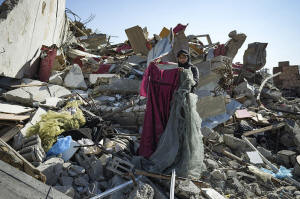Israelis await names of next 4 hostages to be released by Hamas as part
of the ceasefire
 Send a link to a friend
Send a link to a friend
 [January 24, 2025]
By SHLOMO MOR and WAAFA SHURAFA [January 24, 2025]
By SHLOMO MOR and WAAFA SHURAFA
TEL AVIV, Israel (AP) — Relatives of hostages still being held by
militants in Gaza called on Israeli Prime Minister Benjamin Netanyahu
Friday to ensure all remaining captives are freed, while also appealing
to U.S. President Donald Trump to continue pressing for their release.
As a fragile six-week ceasefire between Israel and Hamas entered its
sixth day, Israelis waited anxiously for the names of the next four
hostages who will be released from among the more than 90 still held in
Gaza.
In the Palestinian enclave, civilians in the central and southern part
of the Gaza Strip hoping to return to the remnants of their home in the
battered north faced an agonizing wait.
Israel believes about a third, or possibly as many as half, of the more
than 90 hostages still in Gaza have died. Hamas has not released
definitive information on how many captives are still alive or the names
of those who have died.
“Dear President Trump, first of all we want to say thank you for the
happy moments we felt this week. But we want to tell you we still have
94 hostages, we need them all at home,” said Ayelet Samerano, whose son
Yonatan Samerano is among those still being held. “Please do not stop.
Please continue to press and do everything so that all the 94 hostages
will come home immediately.”
In the first phase of the ceasefire deal, 33 hostages are expected to be
released gradually in return for hundreds of Palestinian prisoners held
by Israel.

The first three Israeli hostages were freed in exchange for 90
Palestinian prisoners on Sunday, the first day of the ceasefire that has
halted the 15-month war that has devastated Gaza. Wide swathes of the
territory have been destroyed, while more than 47,000 Palestinians have
been killed, according to Gaza health authorities, who do not
differentiate between combatants and civilians but say more than half
are women and children.
According to the deal, on Friday Hamas is to announce the names of the
next four hostages to be released on Saturday, after which Israel will
also release a list of which Palestinian prisoners will be freed.
The hostages were among about 250 men, women and children captured by
militants who burst across the border into Israel on Oct. 7, 2023,
killing around 1,200 people in an attack that sparked the war in Gaza.
About 100 were released during a brief ceasefire in November that year,
while the bodies of around three dozen hostages have been recovered in
Gaza and eight hostages have been rescued by the army.
“I call from here to the Prime Minister and negotiating team -- you’re
doing excellent work -- do whatever is necessary to bring everyone back,
to the last hostage,” Samerano said. “We ask you to ensure phase two of
the deal is agreed upon before finishing the current phrase. We cannot
continue living in uncertainty. All hostages must return, and none of
them has time left.”
[to top of second column]
|

Nour Abu Al Zamar salvage items from under the rubble of her
destroyed family home, in Rafah, southern Gaza Strip, Tuesday, Jan.
21, 2025, days after the ceasefire deal between Israel and Hamas
came into effect. (AP Photo/Abdel Kareem Hana)

The 33 to be released in the first phase will include women,
children, sick people and those over 50 — almost all civilians,
though the deal also commits Hamas to freeing all living female
soldiers in Phase 1. Hamas will release living hostages first, but
could release some bodies if they don’t have enough living hostages
in this category. Male soldiers are not expected to be released in
the first phase.
“This week we were moved to watch images of mothers embracing their
daughters, but our hearts break thinking that my son Nimrod and
other men remain behind, and each day they’re there poses a real
danger to their lives,” said Vicky Cohen, whose son Nimrod Cohen is
among the hostages. “The worry that the deal won’t be fully
implemented gnaws at us all. All senior officials openly say that
stopping the deal means a death sentence for those left behind.”
Under the terms of the deal, Palestinians in Gaza will have more
freedom of movement from the north to the south of the enclave.
Civilians in the south will be allowed to take a coastal road to
northern Gaza from Saturday, when Israeli troops are expected to
withdraw from the key route and Hamas is set to release the next
four Israeli hostages.
Those in other parts of the strip seized on the ceasefire this week
to reunite with scattered family members, picking their way through
vast swaths of rubble and trying to salvage what remained of their
homes and their belongings. But those displaced from the north have
had to wait.
“The first thing I’ll do, I’ll kiss the dirt of the land on which I
was born and raised,” said Nadia Al-Debs, one of the many people
gathered in makeshift tents in Gaza’s central city of Deir al-Balah
preparing to set out for home in Gaza City the next day. “We’ll
return so my children can see their father.”
Nafouz al-Rabai, another displaced woman in Deir al-Balah from al-Shati,
along the coast in Gaza City, said the day she walks home will be a
“day of joy for us.”
The return stirs bittersweet emotions. Al-Rabai acknowledged it
would be painful to absorb the scale of damage to the home and the
urban refugee camp she knew and loved. “God knows if I’ll find (my
house) standing or not,” she said. “It’s a very bad life.”
___
Shurafa reported from Deir al-Balah, Gaza Strip.
All contents © copyright 2025 Associated Press. All rights reserved
 |